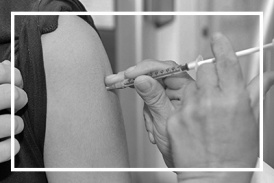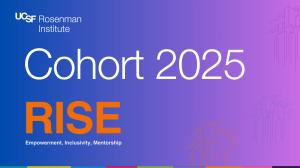UCSF Rosenman RISE Program Welcomes the 2025 Class of Health Innovators
Supporting bold ideas in healthcare through mentorship, community, and commitment to turning bold ideas into life-changing realities.
As part of UCSF—one of the nation’s leading health sciences universities—the RISE Program reflects the Institute’s mission to advance health worldwide through innovation, equity, and education. The program is designed to accelerate impact by providing community access, critical resources, and three months of tailored mentorship to early-stage entrepreneurs.
Mentorship That Moves the Needle
For first-time founders—particularly those without deep institutional or investor connections—the right mentorship can change the trajectory of a company. Through RISE, entrepreneurs gain one-on-one access to experienced professionals who help sharpen their strategy, offer practical advice, and open key doors. RISE mentors offer personalized guidance in areas such as communications, clinical validation, regulatory planning, business development, and fundraising.
RISE mentors do more than advise; they advocate. They provide founders with the clarity, confidence, and connections necessary to accelerate growth. Many alumni credit the program with helping them achieve pivotal milestones.
Meet the 2025 UCSF Rosenman RISE Cohort:
• Emily Wang, Founder & CEO, Beaver Health – A culturally responsive platform backed by the NIH that delivers 24/7, personalized caregiving guidance and cognitive support for older adults.
• Elisabeth Tarullo, Co-Founder & CEO, Magnolia – Leveraging AI to provide real-time, clinically validated caregiving guides that help families prevent and manage crises in elder care.
• Ludovica Labruna, PhD, Founder & CEO, Magnetic Tides – Inventor of XTMP, a revolutionary non-invasive brain stimulation device that enhances therapeutic outcomes through precision targeting.
• Meghana Helder, MD, Founder & CEO, Octin Health – Creator of the Elika Device, which simplifies cardiopulmonary bypass during aortic arch surgery, eliminating the need for circulatory arrest.
• Parag Gad, PhD, Co-Founder & CEO, SpineX – Developer of a bioelectronic therapy recognized by the U.S. FDA as a Breakthrough Device, aimed at restoring motor control in spinal cord injury patients.
• Pascal Odek, Co-Founder & CTO, WellBeam – Optimizing post-acute care through a platform that streamlines EMR workflows and communication among care teams.
A Commitment to Founders and the Future of Healthcare
“The strength of the RISE Program comes from its founders—brilliant entrepreneurs who are deeply committed to transforming healthcare for the better,” said Christine Winoto, Founder and Director of the UCSF Rosenman Institute.
“Mentorship is so important when raising capital, commercializing a product or service, or beginning your growth journey. The RISE program, now in its fourth year, was created to provide talent on demand in the areas of communications, law, market access, market development, business strategy, and investment to women and minority founders who are in the beginning stages of these critical developmental areas,” said Marc Samuels, ADVI Health CEO and co-founder.
The 2025 RISE Program is made possible with the generous support of ADVI Health and Perkins Coie, who share our commitment to helping entrepreneurs turn their groundbreaking ideas into scalable realities.
About the UCSF Rosenman Institute
The UCSF Rosenman Institute is a healthcare innovation hub at the University of California, San Francisco, dedicated to accelerating the development of groundbreaking health technologies. Through programs such as ADAPT, RISE, and Rosenman Innovators, the Institute empowers entrepreneurs by providing access to mentorship, funding, and business development opportunities. Committed to advancing healthcare equity, improving patient outcomes, and transforming care on a national scale, the UCSF Rosenman Institute drives transformative health solutions that impact communities worldwide.
Herminio Neto
UCSF Rosenman Institute
hello|rosenmaninstitute.org| |hello|rosenmaninstitute.org
Legal Disclaimer:
EIN Presswire provides this news content "as is" without warranty of any kind. We do not accept any responsibility or liability for the accuracy, content, images, videos, licenses, completeness, legality, or reliability of the information contained in this article. If you have any complaints or copyright issues related to this article, kindly contact the author above.
Gaby Guha Officially Nominated as Miss Universe Bulgaria 2025
Imagen Network (IMAGE) Deploys Social Node Orchestration to Expand Peer-Led Community Design
DCAC Austin 2025 Welcomes Back Wade Vinson of NVIDIA as Keynote Speaker
Kalendarium
Więcej ważnych informacji
 Jedynka Newserii
Jedynka Newserii

 Jedynka Newserii
Jedynka Newserii

Farmacja

Zagrożenie krztuścem pozostaje najwyższe od ponad trzech dekad. Odporność utrzymuje się do 10 lat po szczepieniu
W ubiegłym roku na krztusiec zachorowało ponad 32 tys. osób. To ok. 35 razy więcej niż rok wcześniej. Ostatnie tygodnie przynoszą wyhamowanie tendencji wzrostowej, ale Główny Inspektor Sanitarny przestrzega przed tą groźną chorobą i wskazuje na konieczność szczepień u dzieci już w okresie niemowlęcym i szczepień przypominających u dorosłych. Dużą rolę w promowaniu tej jedynej formy profilaktyki odgrywają pielęgniarki, które nie tylko informują o korzyściach ze szczepień, ale też mogą do nich kwalifikować.
Bankowość
Zdaniem 80 proc. Polaków ceny nieruchomości są wysokie lub bardzo wysokie. Mimo to i tak wolimy posiadać na własność, niż wynajmować

Tylko 26 proc. Polaków uważa, że mamy obecnie dobry moment na zakup nieruchomości. Dla ośmiu na 10 ankietowanych ceny nieruchomości są obecnie wysokie lub bardzo wysokie. 65 proc. ocenia też, że niewiele osób z ich otoczenia może sobie teraz pozwolić na zakup mieszkania lub domu – wynika z badania „To my. Polacy o nieruchomościach” portalu ogłoszeniowego Nieruchomosci-online.pl.
Transport
Nowe opłaty za emisję CO2 mogą spowodować wzrost kosztów wielu małych i średnich firm. Eksperci apelują o mądre instrumenty wsparcia [DEPESZA]

System ETS2, który zacznie obowiązywać od 2027 roku, nałoży podatek na paliwa kopalne wykorzystywane do ogrzewania budynków czy w transporcie. Koszty w dużej mierze poniosą dostawcy, w tym małe i średnie firmy. – Potencjalny wpływ systemu ETS2 na sektor MŚP w Polsce będzie znacznie mniej drastyczny, niż mogłoby się wydawać. Konieczne jest jednak przygotowanie odpowiednich instrumentów, które wesprą przedsiębiorców w przemianie w kierunku niskoemisyjnym, ale jednocześnie będą unikały podwójnej kompensacji – wskazuje raport WiseEuropa pt. „Wędka czy ryba? Wsparcie dla polskich MŚP w związku z wprowadzeniem ETS2”.
Partner serwisu
Szkolenia

Akademia Newserii
Akademia Newserii to projekt, w ramach którego najlepsi polscy dziennikarze biznesowi, giełdowi oraz lifestylowi, a także szkoleniowcy z wieloletnim doświadczeniem dzielą się swoją wiedzą nt. pracy z mediami.



![Nowe opłaty za emisję CO2 mogą spowodować wzrost kosztów wielu małych i średnich firm. Eksperci apelują o mądre instrumenty wsparcia [DEPESZA]](https://www.newseria.pl/files/1097841585/664-ciezarowki-postoj-foto2,w_85,_small.jpg)




.gif)

 |
| |
| |
|